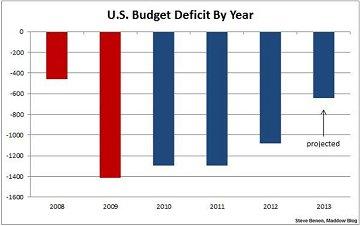Back in April, the federal government ran a surplus of $113 billion. In case anyone’s forgotten what a surplus is — the word largely disappeared from our vocabulary after Bush/Cheney took office in 2001 — it’s the opposite of a deficit. In the month of April, the federal government took in $113 billion more than it spent.
And then in June, it happened again.
The U.S. government posted an unexpectedly large budget surplus in June, a further sign of the rapid improvement in public finances that has taken the heat off Congress to find savings and raise the nation’s borrowing limit.
Rising tax revenue, public spending cuts and big payments to the Treasury from government-backed mortgage companies helped the government take in $117 billion more last month than it paid out, the U.S. Treasury said on Thursday.
It was the largest monthly surplus in the United States in over five years, and the largest June surplus in the nation’s history.
This does not mean the annual budget deficit has vanished altogether, but it is shrinking at a remarkable pace. For those of us who think the deficit should be larger, not smaller, this is not encouraging news, but given that the public, most news organizations, and a few too many politicians are under the impression that our budget shortfall is spiraling out of control, I’m glad reality occasionally rears its head, even if few take notice.
If the American political process were, say, sane, these developments would matter quite a bit. For the last few years, Republican policymakers who created record-high deficits during the Bush/Cheney era have insisted that deficit reduction must be a top national priority. Indeed, it offered a convenient pretense for the GOP to push the policies they wanted anyway — fewer public investments and a weaker safety net.
Now that we’re running occasional monthly surpluses and the deficit is shrinking at the fastest clip we’ve seen since World War II, is there any chance Republicans can ease up a bit? Actually, no — GOP lawmakers are not only pushing more austerity, they’re eagerly laying the groundwork for a new debt-ceiling crisis.
CNBC’s John Harwood for example, reported yesterday that a senior House Republican told him that the chamber won’t resolve the immigration dispute “until after” the debt ceiling is settled.
This follows National Journal’s report from earlier this week noting that GOP lawmakers are drawing up a “menu” of options — they’ll threaten to hurt Americans on purpose unless Democrats agree to more spending cuts, and Dems will be given a series of options to make the issue go away temporarily.











